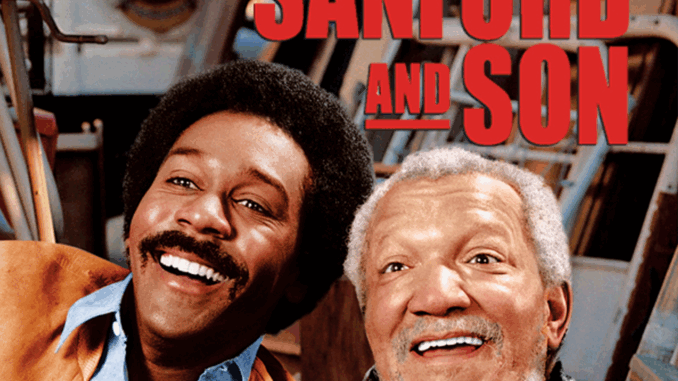
Remembering Raymond Allen: The Comic Genius Who Played the Henpecked Woody Anderson on Sanford and Son
The golden age of 1970s television comedy was defined by the raw, authentic talent that flowed from the Chitlin’ Circuit to the small screen. Among the brilliant ensemble that made Sanford and Son a cultural phenomenon, one performer specialized in quiet, understated brilliance: Raymond Allen.
Allen, who passed away in 2020 at the age of 91, was the master of the comedic slow-burn, best known for his recurring role as Woody Anderson, the long-suffering, perpetually tipsy, and henpecked husband of the formidable Aunt Esther (played by the legendary LaWanda Page). His death marked the passing of one of the last remaining character actors from one of the most important sitcoms in television history, but his legacy as a master of ensemble comedy lives on.
Woody Anderson: The Foil to the Fire
Woody Anderson was more than just a background character; he was an essential ingredient in the explosive chemistry of Sanford and Son. His function in the show’s ecosystem was complex, often serving as a double-foil—a quiet counterpoint to two of the series’ loudest personalities: Fred Sanford and Aunt Esther.
The Henpecked Husband
Woody’s primary dynamic was with his wife, the Bible-thumping, cane-wielding, and famously abrasive Aunt Esther. While Esther spent all her energy verbally sparring with Fred, she saved her withering glares and dominating presence for Woody.
- The Look and the Drink: Woody was a man seeking momentary refuge from his domestic turmoil, often found with a drink in his hand or a dazed look in his eyes. His quiet acceptance of Esther’s dominance was a comedic anchor, making Esther’s intensity all the more hilarious.
- The Comic Relief: Raymond Allen’s brilliance was in his reactionary comedy. He often didn’t need a punchline; a simple sigh, a quick glance away, or a mumbled word was enough to communicate the despair and humor of his situation, drawing sympathetic laughter from the audience. He was the perpetual victim of the show’s loudest personality.
The Unexpected Ally to Fred
Despite being married to Fred’s fiercest enemy, Woody often found himself in Fred Sanford’s corner, if only by necessity or shared suffering.
- When Fred and Esther were locked in their endless insults (“Fish-eye!”), Woody was usually hovering on the sidelines, often nodding in agreement with Fred or sharing a quick, knowing look of disdain for his wife.
- Woody’s willingness to quietly assist in some of Fred’s wild schemes, especially if liquor was involved, provided brief moments of camaraderie between the two men, highlighting a shared rebellion against the forces of domestic order.
A Career Born on Stage
Unlike many sitcom stars of the era, Raymond Allen did not arrive in Hollywood purely by chance. He, like Redd Foxx and LaWanda Page, was a veteran of the stage and the robust tradition of Black Vaudeville and the nightclub circuit.
While his early career saw him honing his craft in theater and smaller venues, his television breakthrough came as the landscape began to change, thanks in large part to the trailblazing work of producer Norman Lear.
The Lear Universe Connection
Allen’s talent for playing the perpetually perplexed and understated character was recognized by the very people who were building the new wave of socially relevant and culturally specific sitcoms. Before Sanford and Son, Allen had already appeared in another massive Norman Lear hit: Good Times.
- Good Times Role: On Good Times, Allen played a character named Ned the Wino in several episodes. Like Woody, this character was often a source of observational humor about life in the Chicago projects, demonstrating Allen’s command of the slightly disheveled, harmlessly inebriated persona.
- The Transition: His ability to bring authenticity and pathos to these roles made him a perfect fit for the ensemble-driven nature of Sanford and Son. His recurring role as Woody from 1972 to 1977 solidified his place in television history.
Post-Sanford and The Continuation of Woody
Though Sanford and Son ended in 1977, the characters were so beloved that the concept was revisited several times. Raymond Allen was one of the few actors who returned to his iconic role in the follow-up series, demonstrating the vital nature of the Woody Anderson character to the whole Sanfords world.
- The Spin-offs: Allen reprised his role in the ill-fated 1977 spin-off Sanford Arms and again in the 1980 sequel series, Sanford. This longevity in the role, despite the changing cast members and production teams, is a testament to the irreplaceable nature of his comedic contribution.
- A Quiet Legacy: Following the end of the Sanford franchise, Allen continued to work, appearing in shows like Starsky and Hutch. However, he eventually stepped back from the spotlight, largely retiring from acting to live a quieter life.
The Unsung Hero of Ensemble Comedy
Raymond Allen’s death serves as a reminder that the success of revolutionary shows like Sanford and Son was never solely about the lead stars. It was built on a foundation of deeply talented character actors who brought nuance, history, and incredible comedic timing to every scene.
Allen’s Woody Anderson, the quiet man in the background, staring off into the distance, was the perfect grounding force for the show’s chaos. He represented the quiet, often overlooked struggle of the working man dealing with an overpowering world, whether it was his formidable wife or the unpredictable schemes of his brother-in-law.
While Redd Foxx’s Fred Sanford provided the fireworks, Raymond Allen’s Woody Anderson provided the smoke—the enduring haze of relatable, resigned, and ultimately hilarious exasperation.
His contribution to comedy is a masterclass in subtlety, proving that sometimes, the biggest laughs come not from the loudest voice, but from the most perfectly timed sigh. Rest in peace, Woody Anderson.
